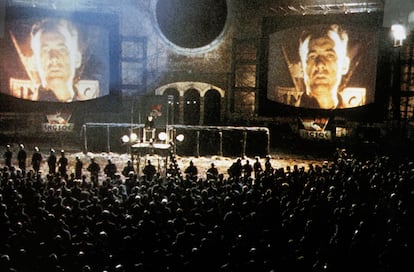Brave real world
The dystopias narrated in the classics by Orwell and Huxley, or more recently, in Paul Lynch’s ‘Prophet Song,’ can become everyday realities. It’s not just something that we fear might happen. It’s already happening

We read dystopian novels as parables of society as we fear it might become: subjected to the domination of a totalitarian state that operates as a machine for controlling our private lives, even our consciences.
Our most common dystopian reference is George Orwell’s 1984 — a future in which dictatorship perfects the instruments of its domination and Big Brother, the omnipresent supreme leader of Oceania, surveils us through our screens. The story is about an absolute power that creates a new reality, which can be erased and rewritten according to the needs of the official ideology.
In Aldous Huxley’s Brave New World — that wondrous land of goodly creatures and beauteous mankind exalted by Miranda in Shakespeare’s The Tempest — happiness is imposed by force, pressed into a uniform mold of acceptable behavior. In this reborn world, peace and wellness reign, but human beings are manufactured in laboratories and education is imparted through slogans repeated until they become fixed in memory.
In Margaret Atwood’s The Handmaid’s Tale, set in an uncertain future in a country called Gilead, formerly the United States, a sect of fundamentalist fanatics enforces a theocratic police state. Women are only useful for giving birth to children, which they do under threat of execution or exile.
The dystopias that these novels describe — subjugated under the total tyranny of states that seek to annihilate individuals by eliminating their freedoms — are not constrained to the fantasies of fiction. Far from existing merely as parables of a future system of life we should strive to reject, they were entirely possible in the past century — the century of the great totalitarian powers — and they continue to be possible in the 21st century, as threats to democracy multiply, even in places where its institutions appear to be the strongest.
The archetypal totalitarian dictatorships of the 20th century, as described by Frank Dikötter in his book Dictators, should be read as real-life dystopias: they were rooted in a single party and in their function as ruthless machines of power depended on a supreme and infallible leader — an omnipresent figure cultivated with great care and constancy. Such was the case for regimes that arose in countries where liberal democracy had fallen into a state of decay, as with Hitler or Mussolini, and for those born of revolutionary cataclysm and war, as under Stalin and Mao Zedong — all of them surrounded by a mythological aura.
In imagined dystopias, and in real ones, the singular leader becomes an omnipresent image in the lives of citizens, and this image is deified through practices of propaganda that strive to cultivate what, in the marketing of totalitarianism, has come to be called “cult of personality.”
Perhaps no other recent dystopian novel brings us closer to today’s reality, and places us in the realm of the seen and lived, than Paul Lynch’s Prophet Song, which won last year’s Booker Prize.
The novel does not take place in a distant era, nor in a mythological country, but in Ireland, in the present day. A totalitarian party comes to power, decrees the suspension of rights and freedoms, and under the auspices of a state of exception, unleashes a wave of repression that sends opponents and dissidents to prison, suppresses demonstrations with bullets, sows terror in the home, and proliferates disappearances; this, in turn, creates a state of rebellion and unleashes a civil war.
It is an impeccably executed novel, written in somber tones while never failing to hold the tension, which grows the more we come to know the fate of its central character, Eilish Stack, a mother who watches her world destroyed under the weight of relentless political persecution, executed by secret police, and survives the imprisonment of her husband, Larry, the bombing of her home, the death of her children, and a flight across the border to the U.K. along with thousands of others migrating in search of refuge, forced into the hands of gangs of human traffickers.
This all seems shocking because it’s happening in a country where, the day before, democratic norms, constitutional guarantees, courts of justice, independent media, and all the elements of daily life that we take for granted were working fine. But what if suddenly a new government comes to power that rejects all that? Either in a coup, or worse, voted into office through free and fair elections by the citizens themselves.
Dystopia — we’re seeing it now — can become our everyday reality. It’s not just that we fear it could happen. It has happened. It is happening. It is the possible dystopia, the real dystopia. The dystopia at our doorstep. The angel with the flaming sword that comes to expel us from our democratic paradise.
Sign up for our weekly newsletter to get more English-language news coverage from EL PAÍS USA Edition
Tu suscripción se está usando en otro dispositivo
¿Quieres añadir otro usuario a tu suscripción?
Si continúas leyendo en este dispositivo, no se podrá leer en el otro.
FlechaTu suscripción se está usando en otro dispositivo y solo puedes acceder a EL PAÍS desde un dispositivo a la vez.
Si quieres compartir tu cuenta, cambia tu suscripción a la modalidad Premium, así podrás añadir otro usuario. Cada uno accederá con su propia cuenta de email, lo que os permitirá personalizar vuestra experiencia en EL PAÍS.
¿Tienes una suscripción de empresa? Accede aquí para contratar más cuentas.
En el caso de no saber quién está usando tu cuenta, te recomendamos cambiar tu contraseña aquí.
Si decides continuar compartiendo tu cuenta, este mensaje se mostrará en tu dispositivo y en el de la otra persona que está usando tu cuenta de forma indefinida, afectando a tu experiencia de lectura. Puedes consultar aquí los términos y condiciones de la suscripción digital.









































